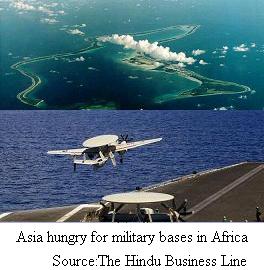|
||||||||
|
|
|
2018-10-07 ArtNo.46384
◆Asia hungry for military bases in Africa
 【Washington】India's recent setback in setting up a base in Seychelles may end up being strategically advantageous over the long run During his state visit to India last month, President Danny Faure of Seychelles was given the red-carpet treatment. He took home major gains in defence for the tiny Indian Ocean nation: a second Dornier aircraft, a $100 million line of credit for maritime security cooperation, and a white shipping information-sharing agreement. However, Seychelles did not reverse its rejection of a military base sought by India despite some careful diplomatic couching about the two countries' shared interests. Like many small states, Seychelles describes its approach to foreign policy as "friend of all and enemy of none." That the construction of a base in Seychelles could have a ripple effect in the Indian Ocean order is not unimaginable. When Japan inaugurated its own military base in Djibouti in 2011, only France and the US had existing bases there. While this initiative was part of Tokyo's broader effort to amend the country's peace constitution, Japan may have inadvertently set a precedent for another north-east Asian power to establish an overseas military base in Africa. As with the Djibouti case, whether India's effort in Assumption Island could set a precedent for China to follow with its own basing in Seychelles remains an open question.  Even without overseas bases, the Indian Navy retains extensive access arrangements in ports throughout the Indian Ocean. In the end, India may still get the access sought at Assumption Island, as Seychelles at present plans to build the base on its own. What is more important, however, is for India to develop the economic dimension of its maritime power. Observers are still waiting to see how the Asia-Africa Growth Corridor emerges under Indian-Japanese cooperation as an alternative to China's Belt and Road Initiative. Such investment is welcomed by smaller Indian Ocean states, which seek alternatives to Chinese infrastructure projects and business practices that are seen as having clear drawbacks. Smaller states will continue to seek infrastructure options beyond China because they desire greater internal and external connectivity to regional and global trading networks. Emphasising their comparative strengths is precisely how major powers concerned about China's expansion — the US, Japan, France, as well as India — can deepen strategic relationships with eager smaller partners in the Indian Ocean region. The writer, Ms Nilanthi Samaranayake, is a strategic studies analyst at CNA, a non-profit research organisation in the Washington, DC area. This article is by special arrangement with the Centre for the Advanced Study of India, University of Pennsylvania. 【News source】 Asia hungry for military bases in Africa ○One world: The aim of SEAnews ◆Recruitment of Ad-SEAnews CanvassersYour Comments / UnsubscribeSEAnews TwitterSEAnews MessengerSEAnewsFacebookSEAnewsGoogleSEAnews eBookstoreSEAnews eBookstore(GoogleJ)SEAnews world circulation |
|
[Your Comments / Unsubscribe]/[您的意见/退订]/[ご意見/配信停止]
Please do not directly reply to the e-mail address which is used for delivering the newsletter. 请别用递送新闻的邮件地址而直接回信。 メールをお届けした送信専用アドレスには返信しないで下さい。 |